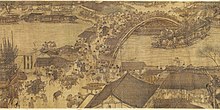Qingming Festival
A celebration of spring,[9][10] it falls on the first day of the fifth solar term (also called Qingming) of the traditional Chinese lunisolar calendar.It became a public holiday in mainland China in 2008, where it is associated with the consumption of qingtuan,[15] green dumplings made of glutinous rice and Chinese mugwort or barley grass.[8] Amid the Li Ji Unrest, he followed his master Prince Chong'er in 655 BC to exile among the Di tribes and around China.[8][10] The people of Shanxi subsequently revered Jie as an immortal and avoided lighting fires for as long as a month in the depths of winter, a practice so injurious to children and the elderly that the area's rulers unsuccessfully attempted to ban it for centuries.Wealthy citizens in China were reportedly holding too many extravagant and ostentatiously expensive ceremonies in honor of their ancestors.In AD 732, Xuanzong sought to curb this practice by declaring that such respects could be formally paid only once a year, on Qingming.For thousands of years, the Chinese imperials, nobility, peasantry, and merchants alike have gathered together to remember the lives of the departed, to visit their tombstones to perform Confucian filial piety by tombsweeping, to visit burial grounds, graveyards or in modern urban cities, the city columbaria, to perform groundskeeping and maintenance and to commit to pray for their ancestors in the uniquely Chinese concept of the afterlife and to offer remembrances of their ancestors to living blood relatives, their kith and kin.They have been preserved especially by the peasantry and are most popular with farmers today, who believe that continued observances will ensure fruitful harvests ahead by appeasing the spirits in the other world.Historically, people would often sing and dance, and Qingming was a time when young couples traditionally started courting.[9] Another ritual related to the festival is the cockfight,[21] as well as being available within that historic and cultural context at Kaifeng Millennium City Park (Qingming Riverside Landscape Garden).Overseas Chinese normally visit the graves of their recently deceased relatives on the weekend nearest to the actual date.The Qingming Festival in Malaysia and Singapore normally starts early in the morning by paying respect to distant ancestors from China at home altars.



Qingming (solar term)ChineseChittyRyukyuansancestor worshipjoss paperMarch equinoxTraditional ChineseSimplified ChineseStandard MandarinHanyu PinyinWade–GilesSuzhounesePha̍k-fa-sṳYue: CantoneseYale RomanizationJyutpingSouthern MinHokkienTâi-lôEastern MinFuzhoutraditional Chinese festivalethnic ChineseHong KongTaiwanMalaysiaSingaporeCambodiaIndonesiaPhilippinesThailandVietnamsolar termQingmingtraditional Chineselunisolar calendarSpring Equinoxjoss sticksreverence of one's ancestorspublic holidayqingtuanglutinous riceChinese mugwortbarley grassChiang Kai-shekcaozaiguoJersey cudweedRyukyu Islandslocal languageCold Food FestivalCold Food or Hanshi FestivalJie Zituistate of JinShanxiSpring and Autumn periodLi Ji UnrestPrince Chong'erDi tribesDuke Mu of QinMount MianimmortalEmperor Xuanzong of Tangin honor of their ancestorsIndonesian ChineseSanggar AgungKolkatanobilitypeasantrymerchantstombstonesConfucianancestorsafterlifejoss-stickspomegranatewillowpalm leavesPalm SundaysChinese operaspirit moneyKowtowingcockfightKaifengApril Fifth MovementTiananmen IncidentChinese historyZhou Enlaithousands honored him during the festival to pay their respectsKuomintangBukit Brown Cemeteryoverseas ChineseCultural Revolutionfilial pietymainland Chinatug of warwillow treesChinese tea culturegreen teasOld Book of TangAlong the River During the Qingming FestivalSong dynastyZhang ZeduanChinese literatureSimplified ChinesePinyinThe Tale of KieuJiajingVietnamese literatureChữ NômVietnamese alphabetAlong the River During Ching Ming FestivalAll Saints' DayAll Souls' DayDay of the DeadDouble Ninth FestivalcemeteriesBon FestivalGhost FestivalHansikDust ClearingWinter Clothes DayRadonitsa / PomynkyEastern SlavsTraditional Chinese holidaysChinese culture